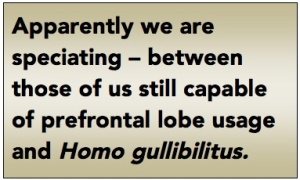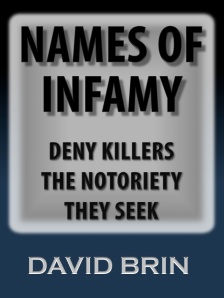Mitt Willard Romney now informs us that he did pay taxes during the last ten years.
Thus he attempts to staunch - despite his own refusal to provide proof in the form of tax returns - the assertion of critics like Democratic senator Harry Reid that Romney paid no taxes at all, across some of that decade. “Every year, I’ve paid at least 13 percent,” Romney said, apparently referring to his effective federal income tax rate.
Now let's do the unusual and actually parse it out. There are more aspects to all of this than you could shake a schtick at:
#1 First off -- please read between the lines. In effect, Mitt Romney is only saying "for the years in question, I paid at least 13% on the final NET taxable income that appeared on line 43 of my form 1040." He said nothing about how large or small that final net taxable income was. Nor how much tax he actually paid. All that his recent statement claims is that the amounts weren't zero, in years when he made between twenty and forty million dollars in gross income.
Consider, carefully. It's not 13% of his gross income, but of the final net taxable income after most income has been removed by shelters and dodges. Thirteen percent… on what was LEFT after sheltering most of it from ever appearing on line 43… and this should impress us?
In a Washington Post article, Ezra Klein lays this out carefully: '“Adjusted gross income” (AGI) is pretty close to what you think about when you think about income. “Taxable income” is what you’re left with after accounting for deductions like the home mortgage interest deduction.' (Or the myriad other deductions and shelters available to the uber-rich.)
'Daniel Shaviro, a professor of tax policy at NYU, made the same point. “The key question here is 13.9 % of what. We know he paid zero tax at the capital gains rate in 2009, since he had loss carryovers for 2010. So he may have had ridiculously low adjusted gross income (AGI), relative to his economic income for the year.”
Yes it is obscure... and yet important. Let's hope the real lesson of all this comes across.
 #2. Mitt Romney did provide 20 years of tax returns to John McCain, back in 2008, when he was being considered for the VP slot. If McCain deserved to see them at that time, as Romney's prospective 'boss,' then what are we? Chopped liver? Aren't we the real bosses, deserving all information about the executive we're meant to hire? Similarly, Romney demanded tax returns from his prospective vice presidential candidates.
#2. Mitt Romney did provide 20 years of tax returns to John McCain, back in 2008, when he was being considered for the VP slot. If McCain deserved to see them at that time, as Romney's prospective 'boss,' then what are we? Chopped liver? Aren't we the real bosses, deserving all information about the executive we're meant to hire? Similarly, Romney demanded tax returns from his prospective vice presidential candidates.
On this aspect, blogmunity member L. Lyons proposed: "Four years ago in the depths of the largest recession since the '30's John McCain and his campaign team vetted Mitt Romney as a potential VP candidate. Part of the vetting was to look at 20 years of IRS returns. Remember this was in 2008 with the economy nearly in freefall. They looked at Romney's tax returns, and chose Sarah Palin."
#3. In any event, Mitt Romney knew he would face this issue in 2012. Indeed, he's been running for president for most of the last two decades. And the GOP tradition held once again - that the nomination always goes (in order of priority) to (i) a sitting GOP president, (ii) a sitting GOP vice president, or - barring those being available - the fellow whose turn it is. That is what has happened every single election year since 1960. Barring situations (i) and (ii), the nominee the fellow who came in second for the nomination last time.
Hence, Mitt knew the nomination would likely fall in his lap in 2012 - as it has - so why did he not get ready, so that at least 4 years of tax records would be pristine and ready for public scrutiny? Isn't the presidency worth sacrificing some tasty tax dodges? Given all that, if there are any embarrassments in those returns, what does that say about the intelligence and foresight of a man who is urging us to "make me commander in chief"?
Frankly, I'd prefer the notion of a Dan Rather Gotcha to the idea that we'd let anywhere near the presidency a man too stupid to clean up his finances before running for the top job.
#4. Is Mitt simply delaying in order to get nominated, and then let whatever S#!^! hit the fan? Less than 2 weeks and counting, then at least he gets to be in history books, even if the party dumps him (unlikely) in October. Ah, but follow that musing for a bit! Suppose six-term Congressman Paul Ryan inherited the top slot, simply because one man picked him for ticket-balancing reasons? What would that say about our crazy party system?
Heck, what does it say that a party would aim to vest full executive power over Pax Americana in a pair of men with zero foreign policy experience whatsoever and a combined total of less than twenty years in public office? And zero at a top national level?
#5. Going back to Harry Reid, the most senior Mormon official in the United States, who hopes to stay that way. I have one piece of advice for Reid that he should carefully consider. I suspect the possibility of a Dan Rather lure… Harry Reid has pounced on an apparent weakness (claiming a Bain investor told him that Romney paid no taxes for ten years.) But remember the Swift Boaters. Reid may have been fed a "reliable" rumor deliberately, in order to draw him onto a branch that could be cut off. You can be sure that tactic will be used at some point, even if it wasn't on this occasion. Double check your sources. And don't be too shocked if, suddenly, at an opportune moment, Mitt opens up a dozen tax returns and there's nothing noteworthy. I don't deem it likely, but it's better than scenario #3 (above)..
And finally: From the same article we offered in lead-off position, lower down. “We pay our taxes,” Ann Romney said. “We are absolutely — beyond paying our taxes, we also give 10 percent of our income to charity, so that you know, we have no issues that way and the only reason we don’t disclose any more is, you know, we just become a bigger target.”
Hm. As faithful and obedient Mormons, they are obliged to tithe 10% of their income to their church. It is pretty much automatic. That is the "charity" of which Mrs. Romney speaks… and it implies that this very very rich couple doesn't give hardly anything beyond that. Nothing at all to what the rest of us would call voluntary generosity.
What? I am hoping she rounded-down! But why would she? Jumping jiminy, even the Koch brothers give something to acceptably rightist charitable causes.
In fact, let's withhold judgement as this is damnation on very slim evidence (then show us the returns!) But on the face of it, this sniffs like aristocrats who cannot be bothered to pay back or pay forward, lifting even a finger to help their nation, or to make a better world.
































